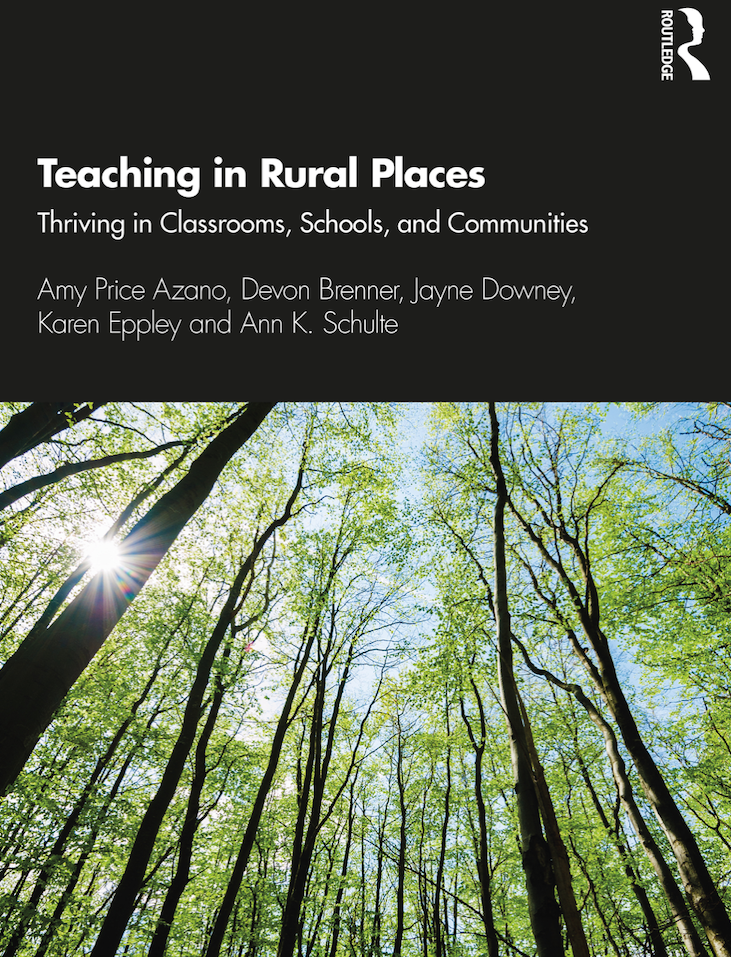Book Description
This teacher education textbook invites preservice and beginning teachers to think critically about the impact of rurality on their work and provides an overview of what it means to live, teach, learn, and thrive in rural communities. This book underscores the importance of teaching in rural schools as an act of social justice—work that dismantles spatial barriers to economic, social, and political justice.
Teaching in Rural Places begins with a foundational section that addresses the importance of thinking about rural education in the U.S. as an educational environment with particular challenges and opportunities. The subsequent

chapters address rural teaching within concentric circles of focus—from communities to schools to classrooms. Chapters provide concrete strategies for understanding rural communities, valuing rural ways of being, and teaching in diverse rural schools by addressing topics such as working with families, building professional networks, addressing trauma, teaching in multi-grade classrooms, and planning place-conscious instruction.
The first of its kind, this comprehensive textbook for rural teacher education is targeted toward preservice and beginning teachers in traditional and alternative teacher education programs as well as new rural teachers participating in induction and mentoring programs. Teaching in Rural Places will help ensure that rural students have the well-prepared teachers they deserve.
Table of Contents
Introduction; Section One: Rural Contexts; 1: Becoming a Rural Teacher; 2: Social Justice and Rural Communities; 3: Understanding Rural Places; 4: Why Place Matters; Section Two: Thriving in Rural Communities; 5: Rural Literacies; 6: Understanding Strengths and Assets in Rural Communities; 7: Families as Partners in Rural Communities; 8: From Here or Away: Relating to Students; Section Three: Thriving in Rural Schools; 9: Building Professional Networks in Rural Schools; 10: Policy and the Rural Teacher; 11: Responding to Trauma; 12: Multi-grade Teaching; Section Four: Thriving in Rural Classrooms; 13: Place-Conscious Instruction; 14: Technology for Learning in the Rural Classroom; 15: Diversity in the Rural Classroom; 16: Teaching Exceptional Learners in Rural Classrooms; 17: Evidence in the Rural Classroom; 18: Teaching as Inquiry: What Works in Rural Classrooms; 19: Thriving as a Rural Teacher
...
View More
Authors
Biography
Amy Price Azano is a teacher educator in the School of Education at Virginia Tech. She grew up in Virginia’s Shenandoah Valley and focuses her scholarship on issues of equity for rural learners.
Devon Brenner transplanted from Michigan to Mississippi over 20 years ago. A professor of literacy teacher education at Mississippi State University, she engages in research that focuses on rural education policy and practice.
Jayne Downey is a professor at Montana State University where she directs the Center for Research on Rural Education. Born and raised on a farm on the prairies, her research and service are dedicated to working with and for rural schools and communities around the world.
Karen Eppley is a former fifth grade teacher who has lived her entire life in one rural valley. Her research interest is at the intersection of literacy education and rural education. She is an associate professor of curriculum and instruction at Penn State University where she teaches in the reading specialist certification program.
Ann K. Schulte is a professor at California State University, Chico. She has been a teacher and teacher educator in primarily rural contexts for 30 years. Her scholarship interests focus on self-study, teacher identity, and university-community partnerships in rural contexts.

